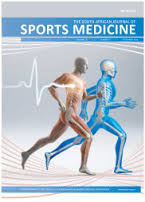Addressing negative psychosocial factors linked to severe injury in professional rugby players: An introduction to a group psychotherapy approach
DOI:
https://doi.org/10.17159/2078-516X/2020/v32i1a8505Abstract
Background: Negative psychosocial sequelae of severe rugby injury (SRI) in professional rugby players are well documented. Unaddressed, these issues can leave players vulnerable to persistent common mental disorders (CMD) and negatively affect injury recovery processes.
Objective: To introduce a psychotherapeutic group intervention aimed at addressing negative psychosocial sequelae linked to SRI in professional rugby player cohorts. Methods: Literature aimed at clarifying the potential efficacy of an integrative group therapy model, the Recovery Mastery Group (RMG), is discussed after which component parts of the intervention are presented.
Case illustration: A case illustration is presented comprising examples of how the RMG framework addressed psychosocial recovery issues in a professional South African rugby team during 2019.
Conclusion: The proposed Recovery Mastery Group (RMG) is presented as a cost- and time- effective psychotherapeutic intervention that integrates well-researched psychotherapeutic techniques. The RMG appears able to address multiple facets of psychosocial injury recovery, while possibly offering protection from the onset of CMD. This introduction to the RMG can be a forerunner of similar research across larger cohorts, in different team sports, to determine wider therapeutic intervention efficacy.
Downloads
Downloads
Published
Issue
Section
License
The South African Journal of Sports Medicine reserves copyright of the material published. The work is licensed under a Creative Commons Attribution 4.0 (CC BY 4.0) International License. Material submitted for publication in the South African Journal of Sports Medicine is accepted provided it has not been published elsewhere. The South African Journal of Sports Medicine does not hold itself responsible for statements made by the authors.
How to Cite
- Abstract 752
- PDF 652






.png)